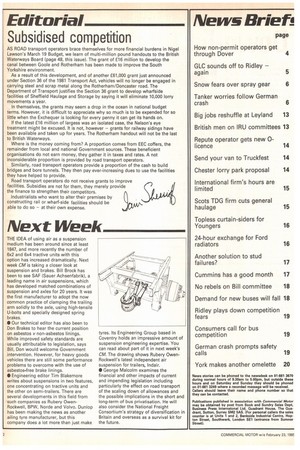Editorial Subsidised competition
Page 4

If you've noticed an error in this article please click here to report it so we can fix it.
AS ROAD transport operators brace themselves for more financial burdens in Nigel Lawson's March 19 Budget, we learn of multi-million pound handouts to the British Waterways Board (page 48, this issue). The grant of £16 million to develop the canal between Goole and Rotherham has been made to improve the South Yorkshire environment.
As a result of this development, and of another £61,000 grant just announced under Section 36 of the 1981 Transport Act, vehicles will no longer be engaged in carrying steel and scrap metal along the Rotherham/Doncaster road. The Department of Transport justifies the Section 36 grant to develop wharfside facilities of Sheffield Haulage and Storage by saying it will eliminate 10,000 lorry movements a year.
In themselves, the grants may seem a drop in the ocean in national budget terms. However, it is difficult to appreciate why so much is to be expended for so little when the Exchequer is looking for every penny it can get its hands on.
If the latest £16 million of largess was an isolated case, the Nelson's eye treatment might be excused. It is not, however grants for railway sidings have been available and taken up for years. The Rotherham handout will not be the last to British Waterways.
Where is the money coming from? A proportion comes from EEC coffers, the remainder from local and national Government sources. These beneficient organisations do not earn money, they gather it in taxes and rates. A not inconsiderable proportion is provided by road transport operators.
Similarly, road transport operators provide a proportion of the cash to build bridges and bore tunnels, They then pay ever-increasing dues to use the facilities they have helped to provide.
Road transport operators do not receive grants to improve facilities. Subsidies are not for them, they merely provide the finance to strengthen their competitors.
Industrialists who want to alter their premises by constructing rail or wharf-side facilities should be able to do so at their own expense.




















































































